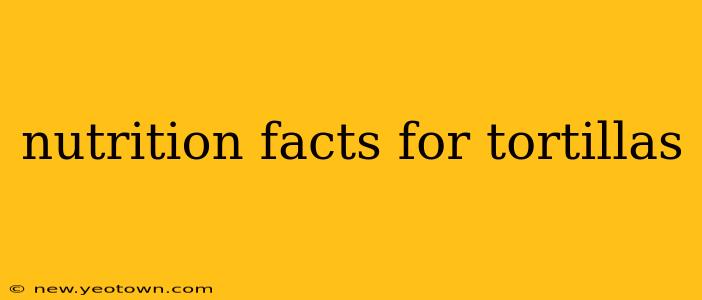Tortillas, the humble foundation of countless culinary delights, are far more than just a blank canvas for your favorite fillings. From the classic corn tortilla to the soft embrace of a flour tortilla, these simple discs pack a surprising nutritional punch – and understanding that punch can significantly impact your dietary choices. Let's embark on a journey to uncover the nutritional facts surrounding these versatile staples.
What are the nutritional differences between corn and flour tortillas?
This is arguably the most frequently asked question regarding tortillas. The answer hinges on the fundamental differences in their ingredients. Corn tortillas, traditionally made from nixtamalized corn (a process involving soaking corn in an alkaline solution), are naturally gluten-free and boast a higher fiber content. They are generally lower in calories and fat compared to their flour counterparts. Flour tortillas, on the other hand, are made from wheat flour, adding gluten and significantly increasing the calorie and carbohydrate content. They often offer a softer texture and lend themselves well to holding heavier fillings. The choice between corn and flour often boils down to personal preference, dietary needs (such as gluten-free diets), and the intended use in a recipe.
How many calories are in a tortilla?
The calorie count in a tortilla varies wildly depending on its size and type. A small corn tortilla might clock in around 50-60 calories, while a larger flour tortilla could easily exceed 100 calories. Factors such as added ingredients (like oil or preservatives) can also bump up the calorie count. Always check the nutrition label on the specific brand and size you are using for the most accurate information. Reading the nutritional information panel carefully is paramount to making informed choices.
How much fiber is in a tortilla?
Fiber content is where corn tortillas really shine. A single corn tortilla can contribute a respectable amount of your daily fiber intake, aiding in digestion and promoting gut health. Flour tortillas, while containing some fiber, generally have significantly less than their corn counterparts. Prioritizing whole-grain flour tortillas can help increase the fiber content, but it still won't match the fiber density of corn tortillas. Aiming for adequate fiber intake is crucial for overall health, and tortillas can play a role in achieving that goal.
Are tortillas healthy?
Whether or not tortillas are "healthy" is a nuanced question. Corn tortillas, due to their higher fiber and lower calorie content, are generally considered a healthier option. However, both corn and flour tortillas can be part of a balanced diet. The key lies in portion control and mindful ingredient selection. Overconsumption of tortillas, regardless of type, can contribute to weight gain due to their carbohydrate content. Choosing smaller tortillas, incorporating them into meals with plenty of vegetables and lean protein, and being aware of added sugars and fats in prepared tortillas are all essential aspects of maintaining a healthy diet that includes these versatile flatbreads.
What are the best tortillas for weight loss?
For those aiming for weight loss, small corn tortillas are generally recommended. Their lower calorie and higher fiber content contribute to satiety, helping you feel fuller for longer on fewer calories. However, even with corn tortillas, mindful portion control remains crucial for successful weight management. Focusing on a balanced diet that incorporates lean proteins, healthy fats, and plenty of fruits and vegetables, alongside the appropriate portion of tortillas, will be a much more effective strategy than relying solely on tortilla choice.
This exploration into the nutritional landscape of tortillas should equip you with the knowledge to make informed decisions. Remember, moderation and balance are key to incorporating tortillas into a healthy lifestyle. Whether you're crafting tacos, enchiladas, or simply enjoying a simple wrap, understanding the nutritional differences can enhance your culinary creativity and support your overall well-being.

